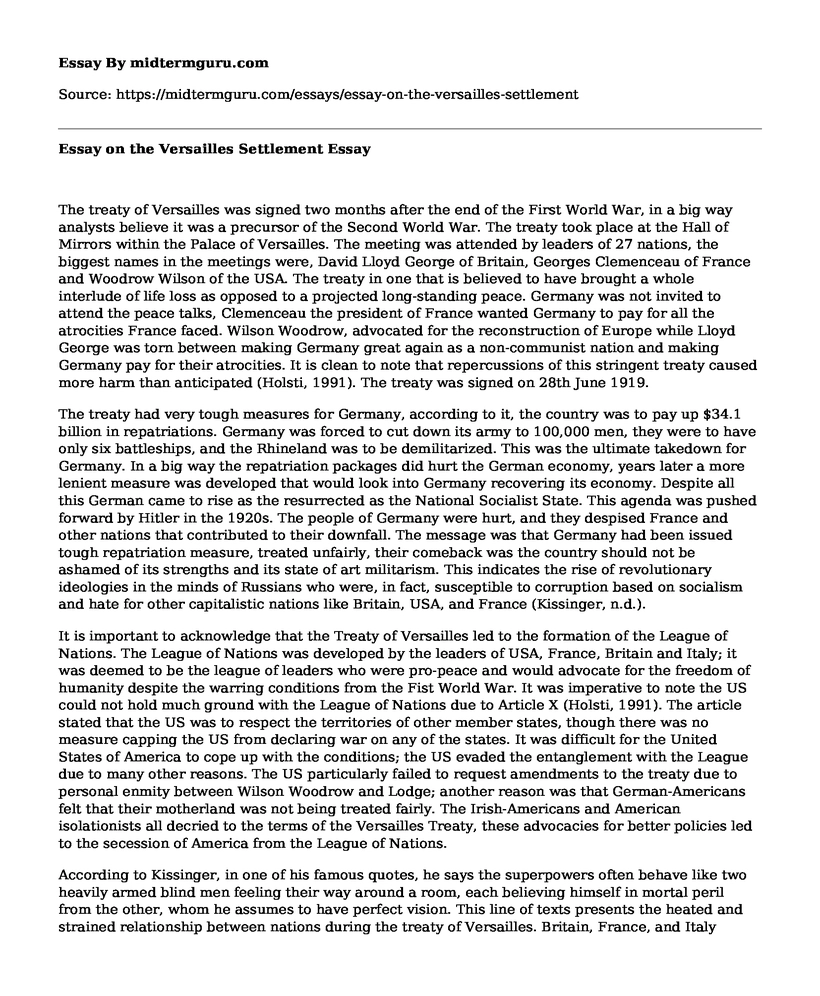The treaty of Versailles was signed two months after the end of the First World War, in a big way analysts believe it was a precursor of the Second World War. The treaty took place at the Hall of Mirrors within the Palace of Versailles. The meeting was attended by leaders of 27 nations, the biggest names in the meetings were, David Lloyd George of Britain, Georges Clemenceau of France and Woodrow Wilson of the USA. The treaty in one that is believed to have brought a whole interlude of life loss as opposed to a projected long-standing peace. Germany was not invited to attend the peace talks, Clemenceau the president of France wanted Germany to pay for all the atrocities France faced. Wilson Woodrow, advocated for the reconstruction of Europe while Lloyd George was torn between making Germany great again as a non-communist nation and making Germany pay for their atrocities. It is clean to note that repercussions of this stringent treaty caused more harm than anticipated (Holsti, 1991). The treaty was signed on 28th June 1919.
The treaty had very tough measures for Germany, according to it, the country was to pay up $34.1 billion in repatriations. Germany was forced to cut down its army to 100,000 men, they were to have only six battleships, and the Rhineland was to be demilitarized. This was the ultimate takedown for Germany. In a big way the repatriation packages did hurt the German economy, years later a more lenient measure was developed that would look into Germany recovering its economy. Despite all this German came to rise as the resurrected as the National Socialist State. This agenda was pushed forward by Hitler in the 1920s. The people of Germany were hurt, and they despised France and other nations that contributed to their downfall. The message was that Germany had been issued tough repatriation measure, treated unfairly, their comeback was the country should not be ashamed of its strengths and its state of art militarism. This indicates the rise of revolutionary ideologies in the minds of Russians who were, in fact, susceptible to corruption based on socialism and hate for other capitalistic nations like Britain, USA, and France (Kissinger, n.d.).
It is important to acknowledge that the Treaty of Versailles led to the formation of the League of Nations. The League of Nations was developed by the leaders of USA, France, Britain and Italy; it was deemed to be the league of leaders who were pro-peace and would advocate for the freedom of humanity despite the warring conditions from the Fist World War. It was imperative to note the US could not hold much ground with the League of Nations due to Article X (Holsti, 1991). The article stated that the US was to respect the territories of other member states, though there was no measure capping the US from declaring war on any of the states. It was difficult for the United States of America to cope up with the conditions; the US evaded the entanglement with the League due to many other reasons. The US particularly failed to request amendments to the treaty due to personal enmity between Wilson Woodrow and Lodge; another reason was that German-Americans felt that their motherland was not being treated fairly. The Irish-Americans and American isolationists all decried to the terms of the Versailles Treaty, these advocacies for better policies led to the secession of America from the League of Nations.
According to Kissinger, in one of his famous quotes, he says the superpowers often behave like two heavily armed blind men feeling their way around a room, each believing himself in mortal peril from the other, whom he assumes to have perfect vision. This line of texts presents the heated and strained relationship between nations during the treaty of Versailles. Britain, France, and Italy assumed the US to be a great military power, in this regard, they placed strong assertions on the treaty and the League of Nations against the US. Finding ultimate peace is rather much more difficult as anticipated by leaders at the Treaty of Versailles. It should be acknowledged that forming world peace strategies while pressing down another cloud the ultimate goal (Kissinger, n.d.). The alienation of Germany and the assertion of punitive measures against the state was the biggest factor that contributed to dissident behavior and conspiracies across Europe. The Treaty of Versailles helped to bring peace to the world for only three years; this means that the treaty was unsuccessful.
Lastly, the treaty factored in the highly contested policy of appeasement. Britain and France alike were unable to confront Germany on its expansionism within the continent. Germany had set on its expansions across Europe, many of the states feared that getting in the way of Germany would lead to another war. The policy of appeasement in the treaty of Versailles blocked other nations from getting into the affairs of Germany lest it sparked another war.
References
Holsti, K. (1991). Peace and war (1st ed.). Cambridge: Cambridge University Press.
Kissinger, H. Diplomacy (1st ed.).
Cite this page
Essay on the Versailles Settlement. (2021, Jun 01). Retrieved from https://midtermguru.com/essays/essay-on-the-versailles-settlement
If you are the original author of this essay and no longer wish to have it published on the midtermguru.com website, please click below to request its removal:
- Historical Significance of Harriet Tubman - Essay Example
- Essay Sample on the Wonders of the Ancient World
- Essay Sample on Fredrick Douglass if He or Was Father of Grafi
- Essay Sample on Mexican American War
- Essay Sample on Mythology and Understanding of Social Practices
- Slavery: A Dark History, Unpunished and Romanticized - Essay Sample
- The Beginnings of US Slavery: The 1619 Voyage of the White Lion - Essay Sample







